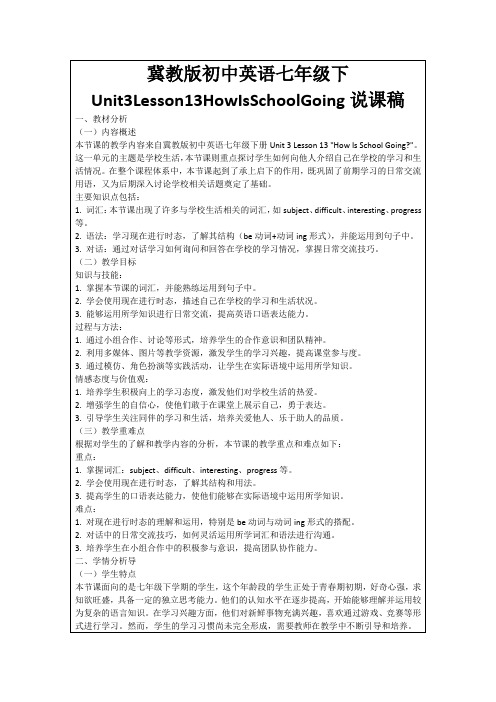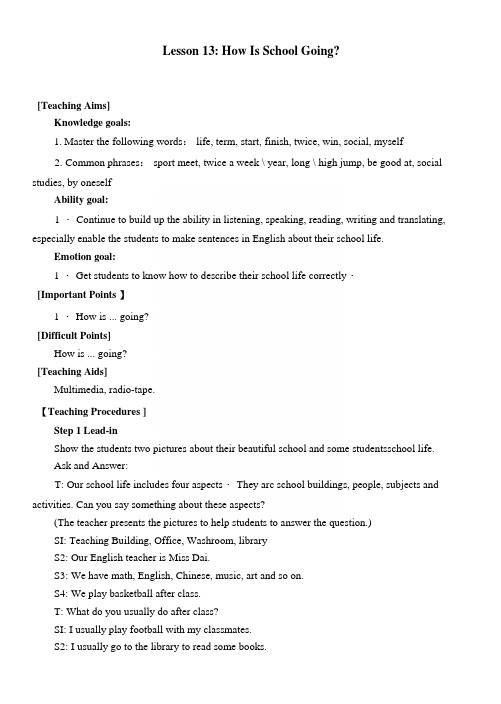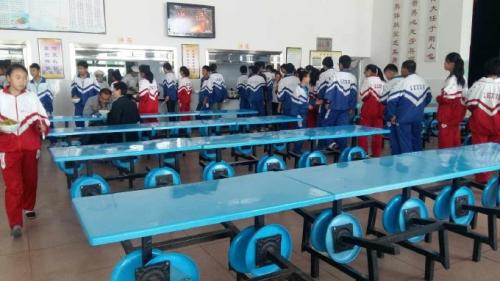冀教版七年级下册13课
冀教版初中英语七年级下Unit3Lesson13HowIsSchoolGoing说课稿

3.课后作业:布置一篇关于“我的学校生活”的短文写作,要求运用本节课所学的词汇和语法。
(四)总结反馈
在总结反馈阶段,我将引导学生进行以下自我评价:
1.让学生回顾本节课所学内容,分享自己的学习心得和收获。
4.联系实际:将所学知识与学生实际生活相结合,让学生感受到英语学习的实用性,从而增强学习动力。
三、教学方法与手段
(一)教学策略
我将采用任务型教学法作为主要教学方法。任务型教学法以学生为中心,注重培养学生的实际应用能力。这种方法的依据在于,语言学习应当与学生的实际需求和生活经验相结合,通过完成具体的任务来促进语言知识的内化。此外,我还将结合情景教学法,通过模拟真实语境,让学生在实际情境中进行语言实践,以提高他们的口语表达能力和交际能力。
主要知识点包括:
1.词汇:本节课出现了许多与学校生活相关的词汇,如subject、difficult、interesting、progress等。
2.语法:学习现在进行时态,了解其结构(be动词+动词ing形式),并能运用到句子中。
3.对话:通过对话学习如何询问和回答在学校的学习情况,掌握日常交流技巧。
3.观看英语短视频,了解不同国家的学校生活,提高跨文化交际能力。
作业的目的是巩固所学知识,提高学生的词汇和语法运用能力,同时培养他们的跨文化交际意识。通过完成作业,学生可以更好地将所学知识内化为自己的能力,为下一节课的学习打下坚实基础。
五、板书设计与教学反思
(一)板书设计
我的板书设计将采用结构化的布局,主要内容分为三个部分:词汇、语法和对话。左侧列出本节课的词汇,中间突出现在进行时态的结构,右侧展示对话的主要句型。板书风格简洁明了,使用不同颜色的粉笔突出重点,增强视觉效果。
冀教版英语七年级下13-15课教案.docx

Lesson 13: How Is School Going?[Teaching Aims]Knowledge goals:1.Master the following words: life, term, start, finish, twice, win, social, myselfmon phrases: sport meet, twice a week \ year, long \ high jump, be good at, social studies, by oneselfAbility goal:1 ・ Continue to build up the ability in listening, speaking, reading, writing and translating, especially enable the students to make sentences in English about their school life.Emotion goal:1 ・ Get students to know how to describe their school life correctly・[Important Points 】1 ・ How is ... going?[Difficult Points]How is ... going?[Teaching Aids]Multimedia, radio-tape.【Teaching Procedures ]Step 1 Lead-inShow the students two pictures about their beautiful school and some studentsschool life.Ask and Answer:T: Our school life includes four aspects・ They arc school buildings, people, subjects and activities. Can you say something about these aspects?(The teacher presents the pictures to help students to answer the question.)SI: Teaching Building, Office, Washroom, libraryS2: Our English teacher is Miss Dai.S3: We have math, English, Chinese, music, art and so on.S4: We play basketball after class.T: What do you usually do after class?SI: I usually play football with my classmates.S2: I usually go to the library to read some books.S3:1 usually go to the school yard to take a walk.S4:1 usually have a talk with my friend.(The teacher presents the pictures to help students to answer the question.)Step 2 Aims presentationShow the aims to students and make them know about the aims.Step 3 Learn the new words1.Show pictures to learn new words. At the same time make a sentence with each word・2.Read the words to partners and show in the classStep 4 ListeningT: Play the audiotape for Lesson 13 (How Is School Life Going?) Play it once and ask the students just to listen.T: Play the audiotape a second time and ask the students to answer two questions・T: Cheek the answers as a class.Step 5 ReadingSs: Read the text twice and answer five questions.(1 )How is Jennyschool life going?(2)How many classes docs Wang Mei have every day?(3)What is Wang Mei?s favourite subject?(4)What is Jenny's favourite subject?(5)What did Jenny make in shop class last week?T: Check the answers as a class.Step 6 Language points1.How is ... going?意思是“.... 怎么样?”用来询问对方最近学习、工作、生活等状况。
冀教版七年级下册英语unit3 Lesson 13

10.—Hi, Mike! How’sitgoing?
—________ C
A. Goodidea. B. Ithinkso.
C. Notbad. D. Ofcourse.
二、用所给单词的适当形式完成句子
11. Howmany________ (class) classes
doyouhaveinthemorning?
4. Mikeiscrazyaboutstamps.
D
He________collectsstampsfirstwhereverhetravels.
A. neverB. seldomC. sometimesD. always
【点拨】考查频度副词辨析。句意为“迈克着迷于邮票。 无论在什么地方旅行,他总是首先集邮”。never从不; seldom不常; sometimes有时; always总是。故选D。
hday.
A. toB. forC. ofD. at
2.—Jack, youswamverywell. Whotaughtyou?
—Nobody. Itaught_______C_. A. IB. meC. myselfD. mine
3. Shesaysherfavourite______C__isEnglish. A. colourB. sportC. subjectD. project
start
4. Everyonelikesto____w__in__ (赢).
Noonewantstobealoser. 5. Ilearnhowtocookby________ (我自己).
myself
二、根据汉语提示完成句子, 并背记英语句子 6. 你的学校生活怎么样?
Unit3SchoolLifeLesson13(冀教版七下)

Homework
学校生活是多姿多彩的,请你来介绍一下你的学校 生活吧。70个词左右。
One boy is a boy, two boys half a boy, three boys no boy. 一个和尚挑水喝,两个和尚抬水喝,三个和尚 没水喝。
2.We always have a big sports meet twice a year. 我们一年经常举行两次大的运动会。 1) have a sports meet,举行运动会。也可说成hold a sports meet。 2)twice a year,一年两次,表示频率。例如: once a year,一年一次。 three times a year,一年三次。 对频率提问要用how often。 —How often do you watch TV? —Three times a week. ——你多久看一次电视?——一周三次。
She is a little busy this term. 2. How many classes does Wang Mei have every day?
She has six classes. 3. What is Wang Mei’s favourite subject?
Her favourite subject is P.E.. 4. What’s Jenny’s favourite subject?
Presentation
They start their lesson.
They are having shop.
They finish their school.
Read the lesson and answer the Байду номын сангаасuestions.
冀教版七年级英语下册教学课件:Lesson 13(共25张PPT)

点拨2 对频率副词提问用how often.
Quiz.
1. Yao Ming is good at ________(play) basketball. 2. I start school at 8:00 a.m. ____ ____ ____ you start school? 3. We have a big sports meet twice a week. _____ ____ we have a big sports meet? 4. I ____ have six classes every day. A. too B. alao C. either. 5. My school subjects are so _________(interest). 6. Last term I______ (win) first place. 7. Last week, I made a bird house all by ____(I).
Yao Ming is good at _______(play) basketball.
Zhang Jie is good at ________(sing)
Liu Xiang is good at ________(run)
点拨1 be good at sth.善长于某事 be good at doing sth.善长于做某事
By learning this lesson, I can: 1. read and write the new words. 2. use the new phrases 3. write about my school life.
New words
term /tɜ:m/
start /sta:t/
冀教版语文七年级下册第13课《蟋蟀》ppt-课件

对等、相称
莴苣叶代替了草丛作为隐藏时不可或缺的遮檐。
不能少
当田野里青蓝色的薰衣草如同散发青烟的香炉在 迎风摇曳时,百灵鸟就不再歌唱了。
飘荡
它居无定所,一片枯叶、一片砖瓦足可遮风避雨。
没有住的地方
这个大学者像哲学家一般地去思考, 像艺术家一般地去观察,像诗人一 般地去感受和表达。
怀着对生命的热爱、敬畏的心态 去思考
作家代表作:
《昆虫记》是法布 尔以毕生的时间与精 力,详细观察了昆虫 的生活和为生活以及 繁衍种族所进行的斗 争,然后以其观察所得记入
详细确切的笔记,最后编写
认真朗读课文,在读的过程
中有不会读及不理解的字词
要随时查字典。然后把课后 PPT模板:-/moban/
PPT素材:-/sucai/
---
本文从体裁上看是一篇说明文,说明对象 是
蟋蟀。
作者在文中主要介绍了蟋蟀的哪些方面的 知识?
1段:介绍蟋蟀的身体特征、居住环境 2-5段:写蟋蟀的筑巢 6-12段:写蟋蟀的歌唱
说明方法
在介绍蟋蟀的过程主要运用了什么说明 方法,在书上画出来并标明其作用?
作比较 第一段“与成年蟋蟀----褪去了 ”
历史课件:/kejian/lish i/
字词带拼音写两遍。
莴苣(wōjù) 螽斯(zhōng) 皱襞(bì) 鞘翅(qiào) 蚱蜢(zhà) 蟋蟀(xīshuài)
精品模板
学习就要掌握技巧,也不是死学要与世界上的万物联系在一起 ,古人说的好活到老学到老,学习是无止境的。多观察、多吃 苦、多研究学识是不断深化人的精神,三字经说过“自不教父 之过教不严师之惰”看来我国在很久以前就非常注意教育,教 育是一个国家是一个国家民族进步的标准,人是在失败中长大 ,每一个名人背后都有不为人知的故事寒窗苦的读圣贤书,既 然我们没在哪社会而感到高兴,既然古人为我们创造知识何必 不去珍惜古人的汗水。
Lesson13课文原文翻译及重点冀教版七年级英语下册
冀教版英语七班级下册课文原文及翻译Lesson 13 Lesson 13 课文翻译Hi, Jenny. How is your school life going?嗨,詹妮,你的校内生活怎么样?Well, I am a little busy this term.这个学期我有点忙。
I have six classes every day.每天我有六节课。
My school days are very long.在校时间很长。
Me too. I also have six classes every day.我也是。
我每天也有六节课。
I start school at 8:00 a.m.我早上八点钟上课。
I usually finish at 5:00 p.m.通常下午五点放学It's a long day, but I like my school.漫长的一天,但是我喜爱我的学校。
My school subjects are so interesting.我们的学科都很好玩。
What subjects do you have?你学哪些课程?I have Chinese, English, math, history and some others.我学习语文,英语,数学,历史和其他科目。
P.E. is my favourite.我最喜爱体育课。
We always have a big sports meet twice a year.我们通常每两年进行一次大型运动会。
I often take part in the long jump.我常常参与跳远活动。
Last term I won first place!上学期我得了第一名!Wow! You're good at the long jump.哇!我擅长跳远。
Yeah! Thank you!是的,感谢!What subjects do you have?你学哪些课程?I have social studies, shop, math, French, English and art.我有社会讨论课,手工艺课,数学课,法语课,英语课和美术课。
七年级语文下册第四单元13《蟋蟀》教案2冀教版
《蟋蟀》一、教学目的1.指导学生认识蟋蟀的外形特征,了解蟋蟀的一些生活习性(生活环境、吃食、鸣叫、争斗等情况)。
2.培养学生的观察能力(细致、有顺序地观察)和分析综合能力(把整体分为部分)。
3.培养学生的学习兴趣。
二、教学准备演示用具:蟋蟀身体结构组合模型、蟋蟀的生活习性挂图(生活环境、吃食、放大的咀嚼式口器、跳跃、鸣叫等)、投影仪。
分组用具:活蟋蟀(雄雌各一只)、试管胶塞、放大镜、(或昆虫盒)、塑料水槽、蟋蟀草、喂蟋蟀吃的食物。
课前准备:布置学生课前捉蟋蟀,(二尾、“三尾”各一只)把捉到的蟋蟀养在瓶里、罐里。
此外向学生进行安全教育和爱护建筑物的教育。
三、教学过程(一)教学引入[为本课教学提供观察材料,并使学生了解蟋蟀的生活环境和生活习性。
]1.让学生把带来的雌雄蟋蟀装进试管,盖好胶塞(或放进昆虫盒内)。
2.谈话:你带来的蟋蟀在什么地方捉到的?蟋蟀生活在什么样的地方?3.分小组相互交流寻找、捕捉、保管蟋蟀的方法。
4.请2~3名学生介绍经验。
5.讲述:我们上节课学习认识了蚂蚁,这节自然课,我们用观察蚂蚁的方法来观察蟋蟀。
(二)学习新课1.指导学生观察蟋蟀身体的外形特征(1)提问:我们捉到了蟋蟀,谁能说一说它长的什么样子?它的身体是由几部分组成的?[认识蟋蟀的外形特征,为学习昆虫知识打基础。
](2)学生回答。
(学生回答可能不全面、不具体。
)(3)谈话:要想全面地、准确地知道蟋蟀的身体是什么样的,我们也像观察蚂蚁那样,先看一看蟋蟀的身体分几部分,然后再从前往后按顺序观察它的各部分是什么样的。
在观察蟋蟀身体的细小部位时,可以使用放大镜。
(4)学生分组观察。
(学生观察时,教师分组巡视,及时提示观察的内容。
)[培养学生按顺序、认真细致的观察能力。
]①蟋蟀的身体分成几部分?②蟋蟀的头部是什么样的?头上长有什么?它们是什么样的?③蟋蟀的身体还长有什么?长在什么部位?什么样子的?(5)学生分组交流、讨论,蟋蟀身体分成几部分、各部分长有什么,是什么样的,观察时还发现什么有趣的现象。
冀教版七年级语文下册目录
冀教版七年级语文下册目录(语文教材)是学生学习冀教版(七班级语文)知识和老师进行语文教学的重要载体,目录能够帮助我们先了解课本。
整理了关于冀教版七班级语文下册的目录,希望对大家有帮助!冀教版七班级语文下目录第一单元1、社戏鲁迅2、哦,香雪铁凝3、罗迦诺的乡村冯至4、北京立交桥刘宗明5、桃花源记陶渊明写作实践:喜看家乡新变化拓展链接:鲁迅和他的朝花夕拾诗词诵读:游山西村陆游清平乐村居辛弃疾第二单元6、少年中国说梁启超7、我为少男少女们歌唱何其芳8、青年[日]池田大作9、保尔和冬妮娅[苏]奥斯特洛夫斯基10、中国少女陈丹燕写作实践:他们就在生活中综合活动口语交际:我谈流行歌曲诗词诵读:临洞庭上张丞相孟浩然使至塞上王维第三单元11、黄河颂光未然12、梅岭三章陈毅13、护钟梁斌14、人民英雄永垂不朽--瞻仰首都人民英雄纪念碑周定舫15、出师表诸葛亮写作实践:生活中的朵朵浪花拓展链接:历史的丰碑(文化)的宝库诗词诵读:渡荆门送别李白黄鹤楼崔颢第四单元16、蟋蟀[法]法布尔17、蜘蛛周建人18、天鹅[法]布丰18、牛群刘成章19、荔枝图序白居易写作实践:可爱的动植物综合活动口语交际:民风民俗大家谈诗词诵读:酬乐天扬州初逢席上见赠刘禹锡题破山寺后禅院常建第五单元19、庐山云雾江祖凡20、黄陵柏贾平凹21、雨的四季刘湛秋22、大自然的语言竺可桢23、三峡郦道元写作实践:春雨惊春清谷天综合活动口语交际:领略大自然的美丽神奇诗词诵读:饮酒二十首其五陶渊明渔家傲秋思范仲淹第六单元24、鲁智深倒拔垂杨柳施耐庵罗贯中25、龙宫借宝吴承恩26、棋王阿城27、口技林嗣环28、大铁椎传魏禧写作实践:给我留下深刻印象的人拓展链接:神魔皆有人情精魅亦通世故--一部家喻户晓的文学巨著《西游记》诗词诵读:浣溪纱晏殊湖上寓居杂咏姜夔附录一:常见修辞(方法)简表附录二:应用文七班级语文课外描写长江的诗1、江流天地外,山色有无中。
(王维《汉江临眺》)2、大江东去,浪淘尽,千古风流人物。
七年级英语下册教学(冀教版,河北专版)Lesson13HowIsSchoolGoing优秀教学案例
5.通过对本节课的学习,使学生感受到英语学习的乐趣,提高他们的英语素养。
在教学过程中,我将密切关注学生的学习进度,关注他们的情感需求,适时调整教学方法和策略,以确保教学目标的有效实现。同时,注重课内外相结合,拓宽学生的学习渠道,提高他们的综合素质。
3.利用合作学习法,鼓励学生互相交流、合作,提高他们的团队协作能力。
(三)情感态度与价值观
1.培养学生积极的学习态度,使他们能够主动参与课堂活动,乐于用英语交流。
2.增强学生的自信心,使他们相信自己能够学好英语,克服学习中的困难。
3.的挑战,健康成长。
4.多元化评价关注全面发展:教师采用多元化的评价方式,关注学生的全面发展,鼓励他们自信地面对学习中的挑战,提高了他们的自我认知和自我调整能力。
5.作业小结巩固知识:教师布置的作业要求学生用一般现在时态写一篇关于学校生活的短文,既巩固了所学知识,又提高了学生的写作能力。同时,鼓励学生互相交流、分享作业成果,进一步提高了他们的表达能力。
在教学过程中,我将密切关注学生的学习进度,关注他们的情感需求,适时调整教学方法和策略,以确保教学目标的有效实现。同时,注重课内外相结合,拓宽学生的学习渠道,提高他们的综合素质。
四、教学内容与过程
(一)导入新课
1.利用图片、视频等多媒体资源,展示学校生活的场景,引导学生回忆学校生活中的美好时光。
2.向学生提问:“你们在学校生活中最开心的事情是什么?”、“你们觉得学校生活有哪些困难?”等问题,激发学生的思考。
2.使学生能够运用一般现在时态描述自己的学校生活,提高他们的英语表达能力。
3.通过本节课的学习,让学生了解学校生活的各个方面,增进对英语学习的兴趣。
- 1、下载文档前请自行甄别文档内容的完整性,平台不提供额外的编辑、内容补充、找答案等附加服务。
- 2、"仅部分预览"的文档,不可在线预览部分如存在完整性等问题,可反馈申请退款(可完整预览的文档不适用该条件!)。
- 3、如文档侵犯您的权益,请联系客服反馈,我们会尽快为您处理(人工客服工作时间:9:00-18:30)。
Think and share your opinions:
What are you good at ?
…
st week, I made a bird house all by myself. by oneself 独立地;单独 e.g. I finished the homework by myself.
Let’s practise Write down your class timetable. Then use it to make up a dialogue. Time
8:20-9:00 9:10-9:50 10:25-11:05 11:20-12:00 14:10-14:50 15:00-15:40
2. How many classes does Wang Mei have every day? She also has six classes every day.
3. What is Wang Mei’s favourite subject? P.E. is her favourite. 4. What is Jenny’s favourite subject? Her favourite subject is shop. 5. What did Jenny make in shop class last week? Last week, she made a bird house all by herself.
......怎么样 运动会 一周/一年两次 跳远/跳高 擅长 社会科学
独自地;单独
Listen to the dialogue and follow reading, then read it in roles!
1.How is your school life going?
How is … going? 意思是“……怎么样?”
我自己(一个人)做完了家庭作业。
e.g. He lives by himself in that large house. 他独自一人住在那所大房子里。
Let’s Do It! 2&3
2.Read and answer. 1. How is Jenny’s school life going?
She is a little busy this term. She has six classes every day. Her school days are very long.
用来询问对方最近学习、工作、生活等状况。
e.g. How is your business going?
你的生意怎么样?
e.g. How is your job going?
你的工作怎么样?
有点儿 运动会 一年两次 once/twice
2.take part in 参加
match
3.You’re good at the long jump. be good at +n. /v.-ing 擅长...;擅长做...
life n. 生活 term n. 学期 start v. 开始;出发 finish v.完成;结束 twice adv. 两次;两倍 win v. 赢得;获胜 social adj. 社会的
shop n. 手工艺课 myg? sports meet twice a week/ year long/high jump be good at social studies by oneself
Subject math
Chinese English morality and law of rule P.E.
music
Example:
A: What subjects do you have? B: … A: How many classes do you have every day? B: … A: When does the first/second/… class start? B: …
You may feel tired, bored and so on when talking about your school life . You may get angry, or complain something or someone, but remember that you will be thankful for these days in school and you will miss these days of school life! Don't take study as a kind of your task, but a kind of desire of exploring knowledge! Come on, boys and girls, just enjoy your school life! It’s really cool!
Homework
1. To write a passage about your school’s subject. 2. To preview Lesson 14: Jenny’s School Life 3. To read the new words and expressions in Lesson 14.
